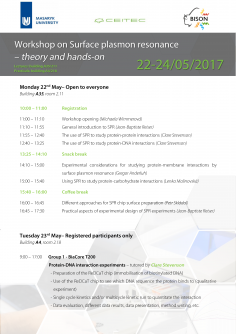Surface Plasmon Resonance
One of the analytical technique for evaluation of receptor-ligand interaction. Applications of SPR include biotherapeutic and drug discovery research, as well as protein activity and stability analysis. SPR is suitable also for characterization of membranes, lipids, nucleic acids and micellar systems. SPR system represents one platform for characterization of biomolecular interactions - kinetics, affinity, specificity, concentration and thermodynamics.
Confirmed spakers:
- Clare Stevenson (John Innes Cente, Norwich)
- Jean-Babtiste Reiser (Institut de Biologie Structurale, Grenoble)
- Gregor Anderluh (National Institute of Chemistry, Ljubljana)
- Petr Skládal (Masaryk University, Brno)
- Lenka Malinovská (Masaryk University, Brno)
Programme
Monday 22nd May– Open to everyone
Building A35, room 211
| 10:00–11:00 | Registration |
|---|---|
| 11:00–11:10 | Workshop opening (Michaela Wimmerová) |
| 11:10–11:55 | General introduction to SPR (Jean-Baptiste Reiser) |
| 11:55–12:40 | The use of SPR to study protein-protein interactions (Clare Stevenson) |
| 11:55–12:40 | The use of SPR to study protein-DNA interactions (Clare Stevenson) |
| 13:25–14:10 | Snack break |
| 14:10–15:00 | Experimental considerations for studying protein-membrane interactions by surface plasmon resonance (Gregor Anderluh) |
| 15:00–15:40 | Using SPR to study protein-carbohydrate interactions (Lenka Malinovská) |
| 15:40–16:00 | Coffee break |
| 16:00–16:45 | Different approaches for SPR chip surface preparation (Petr Skládal) |
| 16:45–17:30 | Practical aspects of experimental design of SPR experiments (Jean-Baptiste Reiser) |
Tuesday 23rd May– Registered participants only
Building A4, room 218
| 9:00–17:00 |
Group 1 - BiaCore T200 Protein-DNA interaction experiments – tutored by Clare Stevenson - Preparation of the ReDCaT chip (immobilisation of biotinylated DNA) - Use of the ReDCaT chip to see which DNA sequence the protein binds to (qualitative experiment) - Single cycle kinetics and/or multicycle kinetic run to quantitate the interaction - Data evaluation, different data results, data presentation, method writing, etc. |
|---|---|
| 9:00–17:00 |
Group 2 – Biacore 3000 Protein-protein experiments – tutored by Jean-Baptiste Reiser - Immobilisation of ligand and blank surface preparation - Test of binding of the ligand at 2 concentrations - Single cycle kinetics and/or multicycle kinetic run to quantitate the interaction - Evaluation of the results - Presentation of alternative methods |
| 17:00–18:00 | Both groups - Excursion to other SPR systems - Zdeněk Farka |
| 18:00–19:30 | Get-together |
Coffee breaks and lunch break will be held according to free time available during experiments
Wednesday 24th May– Registered participants only
Building A4, room 218
| 9:00–17:00 |
Group 1 – Biacore 3000 Protein-protein experiments – tutored by Jean-Baptiste Reiser - Immobilisation of ligand and blank surface preparation - Test of binding of the ligand at 2 concentrations - Single cycle kinetics and/or multicycle kinetic run to quantitate the interaction - Evaluation of the results - Presentation of alternative methods |
|---|---|
| 9:00–17:00 |
Group 2 - BiaCore T200 Protein-DNA interaction experiments – tutored by Clare Stevenson - Preparation of the ReDCaT chip (immobilisation of biotinylated DNA) - Use of the ReDCaT chip to see which DNA sequence the protein binds to (qualitative experiment) - Single cycle kinetics and/or multicycle kinetic run to quantitate the interaction - Data evaluation, different data results, data presentation, method writing, etc. |
| 17:00 | Closing Remarks |
Coffee breaks and lunch break will be held according to free time available during experiments.








